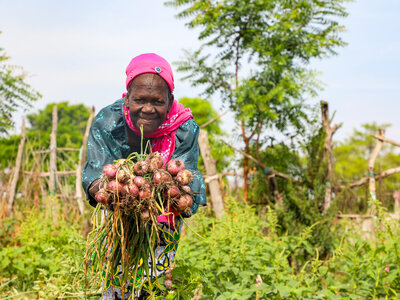Côte d'Ivoire
- 35%
- of people live below the poverty line of US$1.22 per day
- 68%
- of children aged 6 to 59 months are anaemic
- 29.4 million
- population
Côte d’Ivoire has recorded strong economic growth and increased investment in social sectors over the past decade, resulting in tangible progress in poverty reduction and human development.
Building on these achievements, the Government’s National Development Plan (2021–2025) charts a path towards becoming an upper middle-income country by 2030, with a strong focus on strengthening human capital through better health, education and social protection.
At the same time, poverty and malnutrition still affect significant segments of the population, highlighting the need to further expand the reach and impact of national efforts.
In the north, conflict and instability in neighbouring Burkina Faso has led to the arrival of over 66,000 asylum seekers – mostly women and children – adding pressure to already vulnerable communities.
The World Food Programme (WFP) supports Côte d’Ivoire with a mix of emergency assistance and long-term solutions. These include life-saving food and nutrition support, resilience building and climate-smart programmes.
WFP also works to strengthen national systems and institutions to ensure local ownership and sustainability.
A central focus is the sustainability of the national school meals programme, which promotes food systems development and empowers women and youth.
WFP’s operations are concentrated in the north, west and northeast of the country – regions with the highest levels of food insecurity and vulnerability.
What the World Food Programme is doing in Côte d'Ivoire
-
Emergency response
-
In response to the influx of asylum seekers from Burkina Faso, WFP provides monthly cash assistance to 33,880 asylum seekers to meet urgent food needs, along with quarterly support to 5,700 vulnerable host community members. However, due to a worsening funding situation, the level of assistance was halved in 2024, and the number of people assisted reduced by 38 percent in 2025.Most asylum seekers arrive with few belongings and limited livelihood options. WFP post-distribution monitoring shows that nearly all cash is spent on food, highlighting urgent needs as pressure grows on already vulnerable communities and scarce local resources.
-
School meals
-
Nutrition
-
Resilience building
-
Capacity strengthening
-
Supply chain
In focus
Côte d'Ivoire news releases
Go to pagePartners and Donors
Find out more about the state of food security in Côte d'Ivoire
Visit the food security analysis pageOperations in Côte d'Ivoire
Contacts
Office
Riviera Golf 766, Street D28, 1747 Abidjan 01, Côte d’Ivoire
Abidjan Plateau
Côte d’Ivoire






